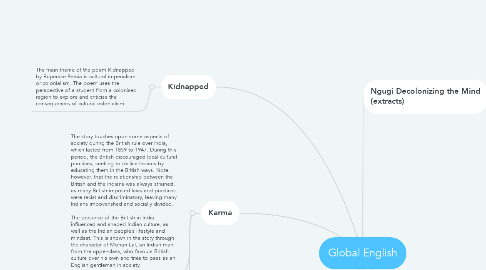
1. Kidnapped
1.1. The main theme of the poem Kidnapped by Ruperake Petaia is cultural imperialism or colonialism. The poem uses the perspective of a student from a colonised region to explore and criticise the consequences of cultural colonialism.
2. Karma
2.1. The story touches upon some aspects of society during the British rule over India, which lasted from 1859 to 1947. During this period, the British discouraged local cultural practices, seeking to civilise Indians by educating them in the British ways. Note, however, that the relationship between the British and the Indians was always strained, as many British-imposed laws and practices were racist and discriminatory, leaving many Indians impoverished and socially divided. The presence of the British in India influenced and shaped Indian culture, as well as the Indian people’s lifestyle and mindset. This is shown in the story through the character of Mohan Lal, an Indian man from the upper-class, who favours British culture over his own and tries to pass as an English gentleman in society.
2.2. Words
2.2.1. Secularism
2.2.1.1. the principle of separation of the state from religious institutions.
3. The White Man’s Burden
3.1. "The White Mans Burden" suggests that the White Man is taking on a very difficult task when colonising others. The poem depicts the lands the White Man is colonising and its mark on them, also suggesting a tense atmosphere.
3.2. Words
3.2.1. Guerilla Warfare
3.2.1.1. Fought largely by independent, irregular bands, sometimes linked to regular forces, it is a warfare of harassment through surprise.
4. Ngugi Decolonizing the Mind (extracts)
4.1. Ngugi is a Kenyan writer and academic who writes primarily in Gikuyu.
4.2. He writes to the local people by writing in Gikuyu, since they don't know english. Even though the audience becomes much smaller, it’s also to keep some of the cultural terms.
4.3. Decolonizing the Mind (extract) was about Ngugi describing the harsh conditions of education in Kenya. The studentens were taught everything about Europe, the education was very eurocentric. The studentens were highly rewarded for speaking or wrighting and the exact opposite. English became the main determinant for a child's progress up the ladder of formal education.
4.4. Word:
4.4.1. Eurocentric
4.4.1.1. Eurocentrism is a worldview that is centered on Western civilization
4.4.2. Lucrative
4.4.2.1. Producing a great deal of profit.
4.4.3. imperialism
4.4.3.1. A policy of extending a country's power and influence through colonization, use of military force, or other means.
5. Orientalism and Mimicry Explained
5.1. Orientalism
5.1.1. Orientalism is a way of seeing that imagines, emphasizes, exaggerates and distorts differences of Arab peoples and cultures as compared to that of Europe and the U.S. It often involves seeing Arab culture as exotic, backward, uncivilized, and at times dangerous.
5.2. Mimicry
5.2.1. Mimicry in colonial and postcolonial literature is most commonly seen when members of a colonized society imitate the language, dress, politics, or cultural attitude of their colonizers. One copies the person in power, because he/her hopes to have access to that same power oneself.
5.3. Words
5.3.1. Orientalism
5.3.2. Mimicry
6. Going Home
6.1. The protagonist of the title story in the collection is a high flyer. He achieves a lot in a very short time. Now, at University, he is a talented and successful athlete, top student and all around really nice guy. He has a special talent for painting and his art is both admired and collected by white people. He feels white because this is the world that he lives in, but he still feels proud of his black roots, although in order to achieve the success that he has, he has turned his back on his roots, and the family that raised him. When he turns twenty one years old he finds himself wanting to revisit the Aboriginal camp where he was born, but he is not well received there, and realizes that there is enormous cultural ignorance on both sides, and also that when he lives amongst his Aboriginal relatives, white people coming to the camp don't treat him as they did out in the white world.
6.2. Words
6.2.1. Wadgula
6.2.1.1. A white person.
6.2.2. Blank
6.2.2.1. Unrelieved by decorative or other features; bare, empty, or plain.
6.2.3. Nyoongah
6.2.3.1. The Noongar are Aboriginal Australian peoples who live in the south-west corner of Western Australia
